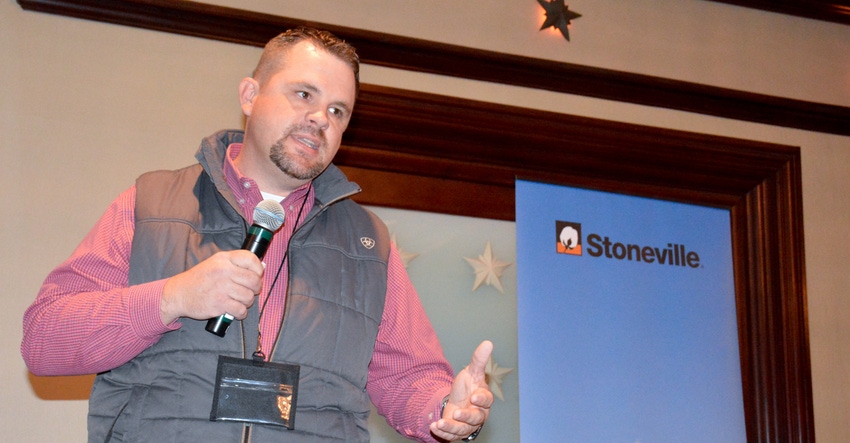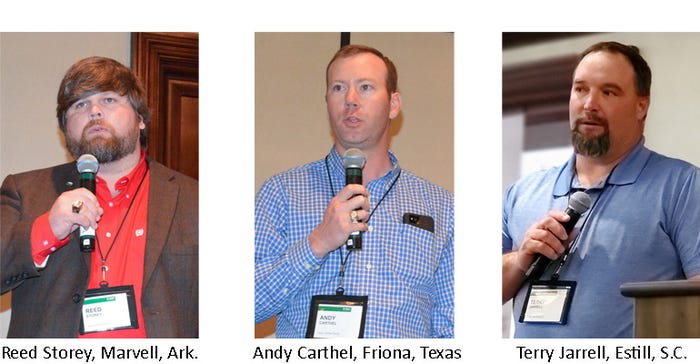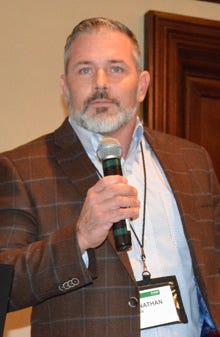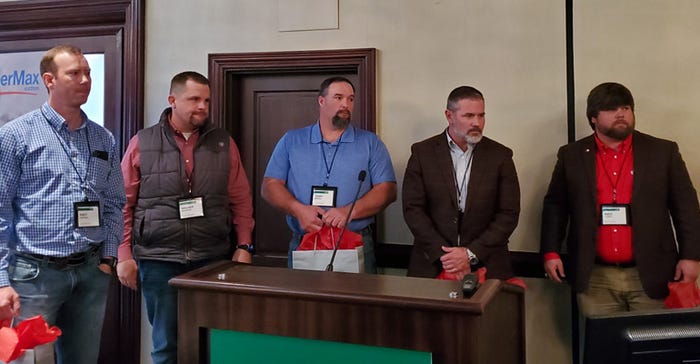
Participation in BASF's APT (Agronomic Performance Trials) allows cotton growers like Walker McAnear to test how a seed variety performs in his situation on his acres near Clarendon, Texas, but on a smaller scale before committing an entire field.
McAnear, along with Cotton Belt producers Terry Jarrell, Estill, S.C., Jonathan Mann, Surrency, Ga., Andy Carthel, Friona, Texas, and Reed Storey, Marvell, Ark., recently addressed about 60 APT growers along with BASF personnel at the 2020 APT Summit in Austin, Texas.
"The APT trial protects me a little bit from myself," McAnear said to the crowd. "I'm not afraid to try just about anything. Before APT, I'd plant every pivot to a different variety. And as you know, that's not a great thing sometimes. Sometimes it's a really good thing. But APT lets me see the variety and how it performs in my situation on my acres."
Storey, who returned to cotton production and began his participation in APT in 2016, said, "In the last two years, we've seen some really good cotton. This year, we reduced our plant population from 42,000 to 36,000. The only seed we didn't have to replant was Stoneville."

Summit
The APT Summit is made up of growers from across the Cotton Belt who support BASF's cotton seed testing program, "which is the cornerstone of advancing new traits into the market commercially," says Steve Nichols, BASF Global Agronomic Services, Cotton.
About 200 growers participate in the trials along with consultants and cotton Extension specialists. "We have multiple people working with us on it," he adds.
Carthel, an APT grower for the last six years, says the summit is an opportunity to meet with other growers who share his passion for cotton production. "I've been doing the trials for quite a few years, and I like to see the different varieties on my farm under my land management practices and to to watch them grow and evaluate them throughout the year. The fun thing about cotton is that it may look one way in the field and then strip another. It could surprise you — good or bad.
"Where I'm at, it's a short growing season. We're at 4,000 feet of elevation." So, what works for Carthel, may not work for growers in other regions, he adds.
See, Cotton Belt producers test potential varieties, gather at APT Summit
The trials allow Carthel to test new varieties on a smaller scale. "I want to make sure it's going to work because picking a variety is one of the most important things we do."
Choices
BASF has two flagship brands, Stoneville germplasm and FiberMax germplasm. Nichols says BASF wants growers to have choices. "Those germplasm pools have different backgrounds that are adapted to different regions, tolerances to different diseases, or maybe heat tolerance."
But they also have multiple trait packages. "We have herbicide-only trait packages, and we have herbicide trait packages combined with insecticide trait technology. We offer multiple brands, multiple trait packages," Nichols adds.
Vigor
On his Georgia farm, Mann planted a lower population, about two seeds per foot or 25,000 seeds per acre. "In the past couple of years, we started out with a lower seed count. My idea was to get more spacing in between to allow more light, so my stalk is stronger and my boll load is a little lower. This year, that seemed to work, and the Stoneville seed vigor allows us to do that."

Hurricanes are a threat to production for both Mann and Jarrell. In 2019, Mann planted some of his cotton earlier than normal. "Tax day, April 15," he said. "And it did really well, but the cotton I planted later in May didn't do so well.
"In the last few years, we've had different levels of hurricane damage and those varieties you can get in quick and get out quick, they came through. So, we intend to plant a little earlier in April. We had this success on our APT trial, so I'm going to try it on a larger scale this year. And as far as Stoneville goes, its early vigor allows us to do that."
Jarrell, who's participated in APT for the last seven years, says the trials give him insight into what's coming down the pipeline and what best suits his fields. "It's a competitive market out there. Everything in our area is competitive as far as farms, land, everything, so you've got to make your best choices."
One surprise in his 2019 trials came from an old variety, Stoneville 6182. "It still produced, and it still did well," he said. "We got to look at some dicamba-tolerant cotton, plus Liberty, plus Roundup, and it did well for us. I think everything can stand improvement, but it's a start."

Jarrell says he wants a variety that is weather-hardy and, in an area where deer are an issue, a variety that is vigorous. "An average field in South Carolina is about 50 acres or less. In that 50 acres, we could have that whole field wiped out by deer. So, cotton being vigorous, getting out of the ground and growing and getting ahead of them is a big deal."
Another topic discussed at the summit, was BASF's e3 sustainability and traceability initiative, something about which Jarrell is excited. He says cotton enrolled and labeled as e3 cotton adds a personal touch for the grower and the consumer. "It would be neat to see where your cotton is being produced and that it's not being blended with other cotton (not enrolled in the e3 program). I think people will pay a little bit more for cotton they can trace and know was grown in the U.S. I would."
see BASF offers e3 sustainability program to growers, provides incentive
For more information about e3 or APT, go to https://agriculture.basf.us/.
About the Author(s)
You May Also Like






